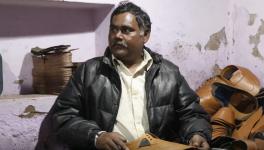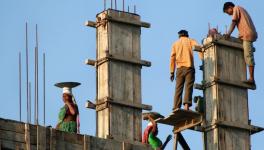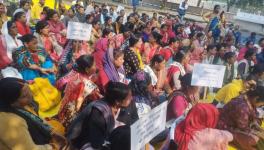COVID-19 in Rural India- III: Farmers in UP’s Lasara Kalan Worried Over Delayed Wheat Harvesting, Lack of Agri Labour

Representational image. | Image Courtesy: Pixabay
This is the third report in a series that provides glimpses into the impact of COVID-19-related policies on life in rural India. The series, commissioned by the Society for Social and Economic Research, comprises reports by various scholars who have been conducting village studies in different parts of India. The reports have been prepared on the basis of telephonic interviews with key informants in their study villages. This report describes the situation in Lasara Kalan village in Azamgarh district of Uttar Pradesh. Most of the construction workers are out of work while farmers are facing uncertainties over lack of labour and equipment to harvest the wheat crop as the harvesting season approaches.
Lasara Kalan is a village of 293 households located in Azamgarh district of Uttar Pradesh. According to the 2011 census of India, 27% of the total population of the village are Scheduled Castes (SC) and majority of households in the village depend on agriculture as the main source of their income. A small number of households in the village own grocery shops, and the rest of the workers in the village are either long-term salaried employees or daily wage workers. Among the rabi crops grown by farmers in the village are wheat, potato, rapeseed/mustard, gram and green peas, while the kharif crops include paddy, maize, arhar (tur) and bajra (pearl millet). Construction, driving and casual multi-purpose labour are among the non-agricultural occupations in which workers are engaged.
By the first of week of February 2020, the farmers of Lasara Kalan village had harvested their crops of potato, rapeseed/mustard, gram and peas. Some of the farmers had put surplus potatoes into cold storage before the lockdown began. Most of the farmers said that they have surplus rapeseed and have been unable to sell it because the prices are low. Although the Minimum Support Price (MSP) declared by the government for rapeseed/mustard is Rs 4,425 per quintal, none of the traders who buy it is willing to pay more than Rs 3,300 per quintal.
The standing wheat crop has already suffered some damage owing to the recent unseasonal rains. The harvesting of wheat has to begin by the second week of April. The large farmers in the village use combine harvesters—which are available for hire—for harvesting wheat. Although a few combine harvesters are owned by people from nearby areas, most of them come from Punjab. Drivers, mechanics and helpers usually bring these combine harvesters from Punjab in the last week of March. However, due to the spread of COVID-19 and the country-wide lockdown, there has been no opportunity to bring them to the village yet. Given the current situation, farmers anticipate that the wheat harvest will be delayed and that the agrarian crisis will worsen.
A few farmers who have contacted the operators of combine harvesters have been told that the combine harvester owners are yet to get passes for inter-state transport amid lockdown. Farmers who use agricultural wage workers to gather their wheat harvests fear that, if the lockdown continues, they might not be able to hire labourers. However, one of the respondents said that the local labourers, who have no non-agricultural employment because of the lockdown, might be willing to engage in agricultural labour since they would need money.
Construction is the most important non-agricultural activity within and in neighbouring villages. However, because of the lockdown, construction material is not available and only a few households that had already procured construction material are able to engage in any construction work. Most of the construction work in the village has stopped since the beginning of the lockdown leaving most construction workers of Lasara Kalan without work.
Some households in the village are engaged in supplying milk to the local market. But, these households have been unable to sell milk because of the closure of the market and have consequently suffered a loss of income. The villagers said that dry straw, green fodder (clover) and other types of animal feed are locally produced in the village and that, as of now, there was no problem in access to animal feed.
As per the informants, there was a rise in the prices of food grains and vegetables in the first week of lockdown in comparison with the week before the lockdown. The prices of essentials like tur dal, potato, onion, tomato, and garlic, whole gram, sugar and wheat flour as well as vegetables like bhindi, parwal and cauliflower witnessed a rise in the first week of lockdown. The change in prices of some of these essential items is listed in the following the table.
Table 1. Prices of essential items in Lasara Kalan, before and during the lockdown Commodities
Source: As reported by the informants
Shopkeepers in the village complained that local shops have been closed since March 21. One of the respondents, who owns a shop selling sewing machines, said that he had borrowed Rs 2 lakh to procure new machines in anticipation of increased demand during the marriage season. His business has been severely hit by the lockdown. He also mentioned that several of his customers had bought machines on credit, and were unable to repay their debt. A respondent who has a furniture shop in the local market said that the supply of timber had stopped due to the lockdown. He had to complete a few orders before the upcoming marriage season, but meeting the deadline seems impossible now. He said that unless work began again soon, he would be unable even to pay the salaries of his two workers.
About five kilometres from the village is the local branch of the Union Bank of India, which is the nearest bank to Lasara Kalan. The ATM is located inside the building and can only be accessed during office hours. The residents of the village use the Fino Payments System in the local market when they need cash. The Fino Payments Bank has authorised a person in the local market where residents of the village get money using their ATM cards or through their Aadhar Cards, which are linked to their bank accounts. The agent charges 1% for the withdrawal of money. The respondents said that amid the lockdown, even this payments service is also curtailed, resulting in a cash crunch. However, the local administration has allowed the agent to open his office for a few hours every day.
To conclude, the countrywide lockdown to contain the spread of COVID-19 has brought the rural economy to a grinding halt. Whether and how farmers will manage to harvest wheat in the next two weeks are critical questions. With the shops closed and the prices of essential items witnessing a steep increase, the residents are facing severe difficulties.
There was no MGNREGA work in the village during the lockdown. The distribution of wheat and rice from the Public Distribution System to both the Patra-grihasthi and Antyodaya ration card holders is to take place in the first week of April.
[This article is based on information provided by 18 individuals through telephonic conversations conducted between March 29 and 31, 2020, including nine farmers, five shopkeepers, three government employees and one driver. All respondents own some agricultural land; three of them have also leased in land for cultivation. Two of the three sharecroppers are from Other Backward Classes (OBC), and one is SC.]
The author is an Assistant Professor at TISS, Hyderabad.
Get the latest reports & analysis with people's perspective on Protests, movements & deep analytical videos, discussions of the current affairs in your Telegram app. Subscribe to NewsClick's Telegram channel & get Real-Time updates on stories, as they get published on our website.























